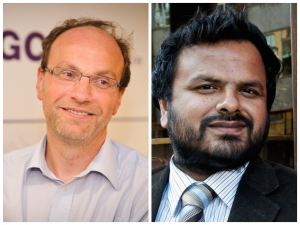In this episode of Development Drums, I speak with Ben Ramalingam and Stefan Dercon about whether complexity and systems thinking offers actionable insights for better development interventions.
Ben Ramalingam is an independent researcher who has worked with development and humanitarian organisations including UN bodies, NGOs, the Red Cross movement, and government agencies. He is affiliated with the London School of Economics and the Overseas Development Institute, amongst other institutions and is the author of Aid on the Edge of Chaos: Rethinking International Cooperation in a Complex World. Stefan Dercon is a Professor of Development Economics at the University of Oxford and the Chief Economist at the Department for International Development, the UK government’s aid agency. .
.
In the podcast, I ask Ben to pin down what we’re talking about when we talk about complexity and complex systems, and ask Stefan whether any of this is actually new to development economics research or policy, which has long incorporated elements of complexity thinking. We debate whether systems thinking gives donors and governments new and useful tools, including for humanitarian intervention.
Podcast: Play in new window | Download
Subscribe: RSS
Pingback: Does complexity thinking have anything to offer the complicated world of aid? | Devpolicy Blog from the Development Policy Centre